
Accredited TEFL/TESOL Courses: Online, In-Person & Hybrid
New to TESOL/TEFL courses? You’re in the right place! We’ll help you get qualified for the experience of a lifetime teaching English as a foreign language.
Start Your TEFL/TESOL Journey – Teach English Online or Abroad!
Earning a TEFL or TESOL course certification opens the door to exciting opportunities worldwide. Whether you want to teach English online or in person, we’re here to help you get started.
On this page, you’ll find answers to common questions, guidance on choosing the right TEFL course, and insights into where TEFL/TESOL certification can take your career.
Bridge TEFL Certification Courses
Discover what makes Bridge TEFL courses stand out, explore accredited TEFL certification options (online, in-person, and hybrid), and find the right TEFL course to match your teaching and career goals.
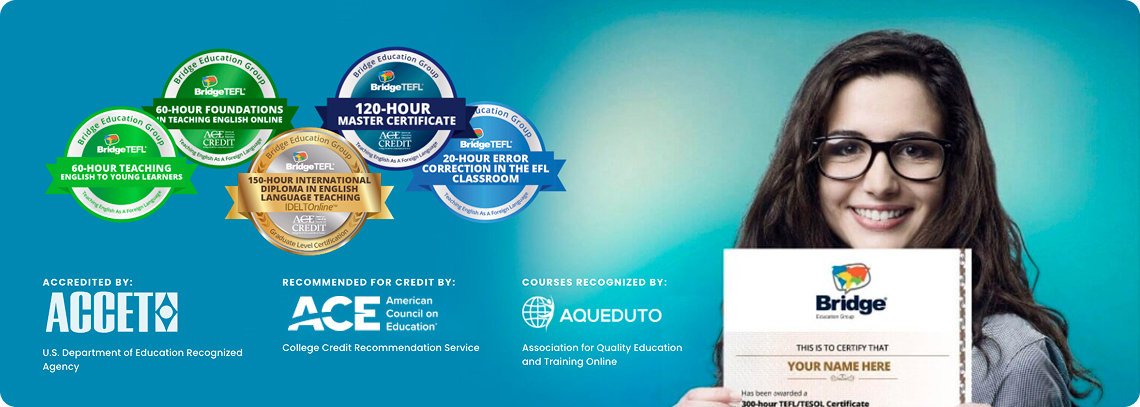
What Makes Bridge TEFL/TESOL Certification Courses Different?
Train with a trusted leader in TEFL education
With over 35 years of experience, Bridge is more than just a TEFL course provider – we’re an accredited educational institution specializing in language teacher training.
Earn an accredited, internationally recognized TEFL certificate
A Bridge TEFL/TESOL certification is verifiable and widely accepted by schools and employers worldwide.
Choose the TEFL course format that fits your schedule
We offer onsite, online, and hybrid TEFL courses, providing flexible and affordable options to match your career goals and budget.
Earn college credit and CEUs with your TEFL course
As an ACCET-accredited institution (recognized by the U.S. Department of Education), Bridge courses are eligible for university credit and Continuing Education Units (CEUs).
Join a global network of English teachers
Connect with over 70,000+ graduates from 140+ countries, access the Bridge Job Board, and be part of an international community of TEFL professionals.
Continue your professional development throughout your career
From initial TEFL certification to stackable professional development courses, Bridge supports your long-term growth as an English teacher.
Download Catalog
Ready to explore all of Bridge’s TEFL courses?
Download our comprehensive course catalog to discover a full range of accredited TEFL certification programs, including professional development courses, Micro-credentials, and advanced TEFL training to support you at every stage of your TEFL/TESOL journey.
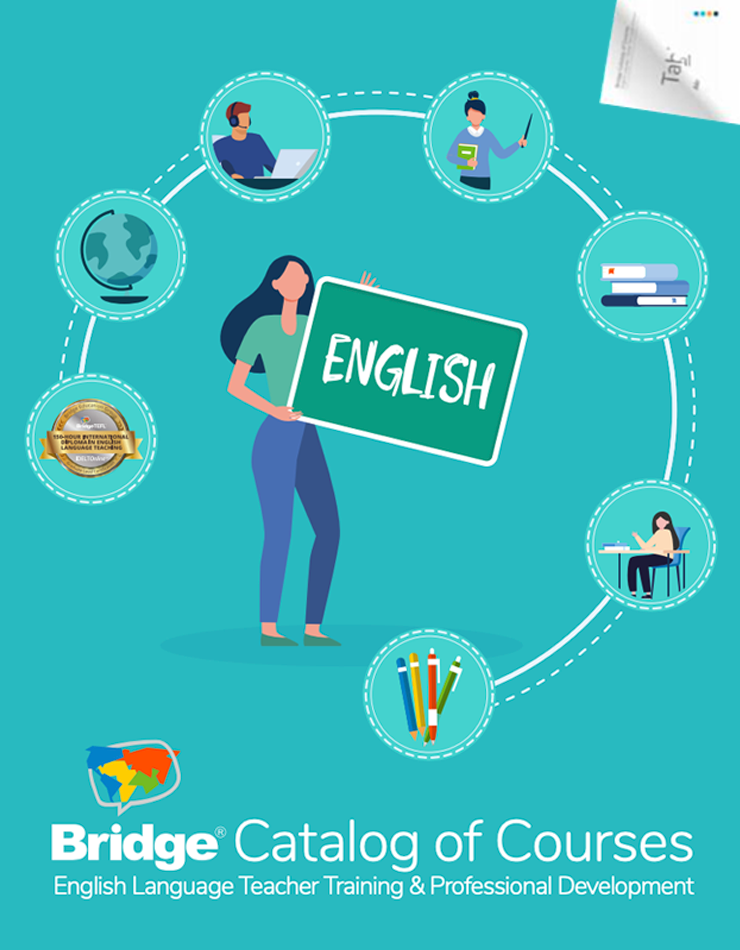

Cheryl, from Jamaica graduate of the Bridge Specialized Certificate in Teaching Business English
![student says]() What Our Students Are Saying
What Our Students Are Saying
What Types of TEFL Courses Does Bridge Offer?
Online TEFL Certification Courses
Bridge offers a growing library of 30+ accredited TEFL courses online, designed to help you start teaching English and advance throughout your TEFL/TESOL career.
Professional Certificates – Comprehensive TEFL certification programs that qualify you for English teaching jobs worldwide
Foundational Certificates– Entry-level TEFL courses covering teaching methodology and essential classroom skills
Specialized Certificates – Advanced TEFL training in high-demand areas like Business English, Young Learners, and Teaching English Online
Micro-credentials – Short, targeted TEFL courses to enhance specific teaching skills and keep your knowledge up to date

What Are the Benefits of Online TEFL/TESOL Courses?
With a Bridge TEFL certification online, you’ll gain flexible, affordable, and internationally recognized training to qualify for English teaching jobs worldwide.
Flexible schedule
Start your online TEFL certification course any time and study at your own pace.
Affordable
Online TEFL courses are a cost-effective alternative to in-person training.
Convenient
Complete your TEFL course online from anywhere - no need to travel!
Internationally recognized certification
Accredited TEFL certificates (120+ hours) are widely accepted by schools and language institutes worldwide.
Personal tutor support
Work with a qualified TEFL instructor who provides guidance, feedback, and answers to your questions.
Interactive content
Engage with quizzes, discussion boards, instructional videos, and downloadable resources for a dynamic learning experience.
Onsite & Blended TEFL Certification Courses
Prefer a hands-on learning experience? Earn your TEFL certification at a Bridge Authorized Training Center in locations worldwide!
TEFL Course Locations Include:
Vietnam
Algeria
Jamaica
Brazil
And more!

What Are the Benefits of Onsite or Blended TEFL Courses?
With onsite and blended TEFL certification courses, you’ll gain real-world teaching practice, a global network, and career opportunities to launch your career with confidence.
Gain hands-on teaching experience
New TEFL teachers develop practical classroom skills by presenting lessons to real students.
Build valuable connections
Fellow trainees, instructors, and TEFL center staff become your support system as you begin your EFL teaching journey.
Expand your job network
Make professional connections and take advantage of job placement assistance offered by training centers to secure your first English teaching job.
Which TEFL Course Is Right for You?
Not sure which TEFL certification fits your goals? We’ll help you explore your TEFL/TESOL options based on your teaching plans and career aspirations - whether you’re looking to teach English abroad, online, or specialize in a high-demand area. Plus, get inspired by real success stories from Bridge graduates teaching worldwide!
I Want to Teach English Abroad
With an accredited TEFL certification, you can teach English learners of all ages in schools, language institutes, and businesses worldwide.
Types of English Teaching Jobs Abroad:
Teach English at a language institute – Work with kids or adults in a structured classroom setting.
Teach English at a K-12 school – Help young learners develop English fluency in an academic environment.
Teach Business English onsite at companies – Train professionals in corporate English to enhance their global communication skills.
Chris,
from the USA

teaches English in Japan (and started his own teaching business!)
Shella,
from the Philippines

teaches kids at an international school in Taiwan.
Luis,
from Colombia

teaches English as bilingual school in his native Colombia.
Recommended TEFL/TESOL Courses to Teach English Worldwide
New to Teaching? Start with a Professional TEFL/TESOL Certificate
A Bridge Professional TEFL/TESOL Certification is the ideal starting point for new English teachers. These 100% online, accredited TEFL courses provide essential training in teaching strategies, lesson planning, and grammar, meeting the requirements for thousands of English teaching jobs worldwide.
Choose from Two Levels of Accredited TEFL/TESOL Certification:
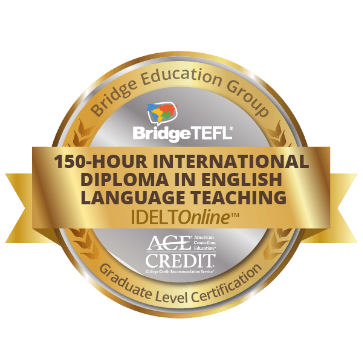
150-Hour Bridge International Diploma in English Language Teaching (IDELTOnline™)
Stand out for top English teaching jobs worldwide with our most advanced, graduate-level TEFL certification.
Join an interactive, instructor-led course with a global cohort, participating in collaborative discussions and activities.
Exceeds standard TEFL job certification requirements, making you a highly competitive candidate.
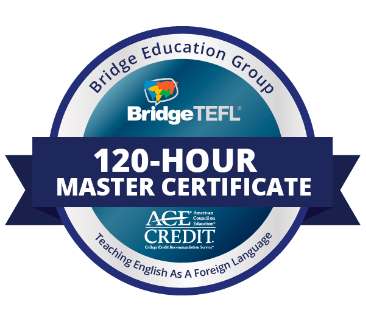
120-Hour Bridge Master TEFL/TESOL Certificate
A self-paced, tutor-supported course that meets international TEFL certification standards.
Recommended for undergraduate-level university credit by the American Council on Education.
Features an interactive online learning platform with engaging course materials.
Classroom & Blended TEFL Certification Options
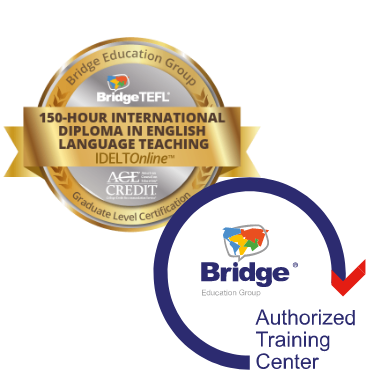
IDELT or Master Blended TEFL Certificates
Combine onsite, hands-on teacher training with an accredited TEFL certification.
Add a 20-hour in-person teaching workshop at a Bridge Authorized Training Center worldwide.
Gain real classroom experience to boost your teaching confidence and job prospects.
With flexible online and blended TEFL courses, you can choose the right certification to match your teaching goals and international job opportunities.
I Want to Teach English Online
Earn your TEFL certification online and launch a flexible, remote English teaching career - working from anywhere in the world, on your own schedule.
Types of Online English Teaching Jobs:
-
Teach English online with a company – Work for an established online language school that provides lesson plans and students.
-
Teach English online through a teacher marketplace – Join platforms where students book lessons directly with you.
-
Teach English online as a freelancer/independent teacher – Build your own online teaching business, set your rates and schedule, and teach on your terms.
Cheryl,
in Jamaica

teaches business English online with a company.
Ken,
from the USA

works online as an independent English teach in Colombia.
Margarida,
from Portugal

is a digital nomad, teaching online as she travels the globe.
Recommended TEFL/TESOL Courses to Teach English Online
We offer two TEFL certification pathways based on your teaching experience:
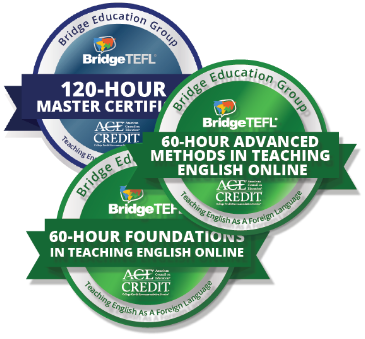
Comprehensive Certification Bundle – For New TEFL Teachers
New to TEFL? Gain the skills needed to teach English online and worldwide.
Start with a Professional TEFL/TESOL Certification to build a strong teaching foundation.
Continue with specialized online teaching training to master virtual classroom strategies.
This three-course bundle ensures you’re fully prepared for online teaching jobs.
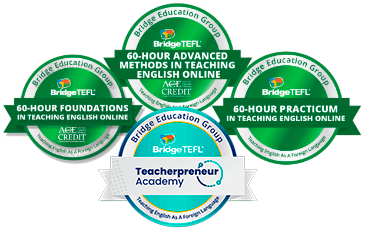
Specialized Certification in Teaching English Online – For Certified TEFL Teachers
Already certified? Get the training needed to transition to online teaching.
The four-course Teaching English Online suite builds on your existing TEFL knowledge.
Learn the latest virtual teaching techniques in Foundations & Advanced Methods in Teaching English Online.
Gain real-world experience with the Practicum in Teaching English Online.
Learn how to create a product offering, find your own students, control your schedule, and market yourself in the Teacherpreneur Academy.
With TEFL certification tailored for online teaching, you’ll be ready to teach remotely, work from anywhere, and qualify for the best online English teaching jobs.
I Want to Advance My TEFL Career with Professional Development
Continuous learning is essential for English language educators. After earning your initial TEFL/TESOL certification, enhance your skills with specialized training and professional development courses.
Why Invest in Ongoing TEFL/TESOL Training?
Boost your resume – Stand out to employers with advanced TEFL certifications.
Stay up to date – Keep your teaching skills current and get fresh classroom strategies.
Specialize in high-demand areas – Advance your career by focusing on Teaching Business English, Young Learners, Exam Preparation, or Online Teaching.
Jorge,
a teacher in Chile,

added Specialized Certification in Teaching Business English to his Bridge IDELTOnline™ training.
Alicia,
a university professor in Chile,
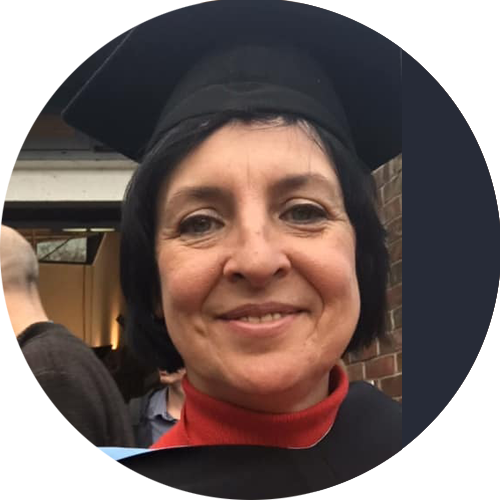
took Micro-credentials courses in IELTS Exam Prep and Error Correction in the EFL Classroom.
Deborah,
a teacher in Switzerland,

added Specialized Certification in Teaching Business English to her Bridge IDELTOnline™ training.
Recommended TEFL/TESOL Courses for Professional Development
Bridge offers a stackable portfolio of professional development courses. Whether you’re looking to expand your expertise, stay competitive, or refresh your teaching skills, these specialized TEFL certifications can help you advance your career.
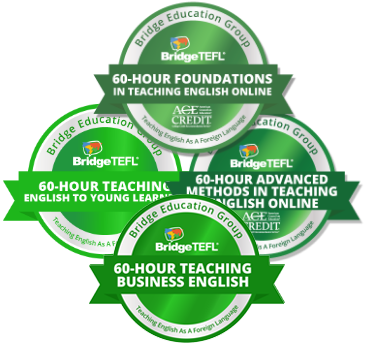
Specialized TEFL Certificates
Take your teaching to the next level by specializing in high-demand TEFL fields, including:
Teaching Business English – Equip professionals with essential workplace communication skills.
Teaching English Online – Master virtual teaching strategies and stand out in the remote job market.
Teaching Young Learners – Learn best practices for engaging young students in language learning.
These targeted TEFL certifications help you qualify for higher-paying jobs and stand out to employers worldwide.
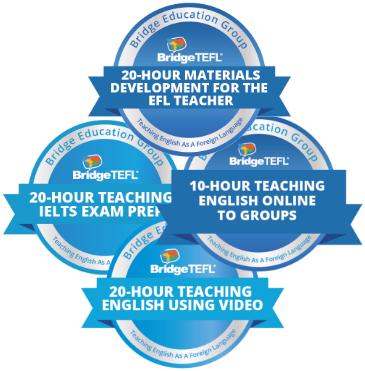
TEFL Micro-Credentials
Short on time? Get fresh teaching ideas and enhance your skills with Bridge Micro-Credentials, covering topics such as:
Engaging games for the online classroom
Teaching IELTS exam preparation
Developing ESL teaching materials
Teaching English online to groups
With specialized TEFL training, you can stay ahead of industry trends, improve your classroom techniques, and continue growing as an English language educator.
Contact an advisor today!

Rachel Story,
Bridge Program Advisor
Not sure which course is right for you?
Join a Free TEFL/TESOL Info Session to explore your options and find the best course for your career goals.
TEFL Certification Course FAQs
Starting your TEFL/TESOL journey? We’ve got you covered! Explore answers to the most common questions about TEFL courses, certification requirements, and career opportunities.
TEFL stands for Teaching English as a Foreign Language. It refers to teaching English in countries where English is not the primary language. For example, a TEFL-certified teacher from the U.S. might teach English in China, Spain, or Brazil.
A TEFL certification qualifies you for English teaching jobs worldwide and online, making it the gold standard for aspiring English language teachers.
A TEFL certification (Teaching English as a Foreign Language) is the industry-standard qualification for teaching English to non-native speakers worldwide and online.
Earning a TEFL/TESOL certificate provides:
- Essential training in teaching methodology, lesson planning, and classroom management.
- Eligibility for English teaching jobs in schools, language institutes, and online platforms.
- Recognition by employers globally, ensuring credibility in the TEFL job market.
Types of TEFL Certification
- Online TEFL certification – Flexible, self-paced, and tutor-led programs.
- Blended TEFL certification – Combines online coursework with in-person teaching practice.
Bridge offers accredited TEFL/TESOL courses, including the 120-hour Bridge Master TEFL Certificate and the 150-hour IDELTOnline™, designed to meet employer requirements and boost your teaching career.
While TEFL (Teaching English as a Foreign Language) and TESOL (Teaching English to Speakers of Other Languages) are often used interchangeably, they have slight distinctions:
- TEFL refers to teaching English in countries where English is not the primary language (e.g., teaching English in China or Spain).
- TESOL is a broader term that includes both TEFL and TESL (Teaching English as a Second Language).
- TESL applies to teaching English in countries where English is the primary language (e.g., teaching international students in the U.S. or Canada).
When it comes to TEFL/TESOL certification, most employers accept both terms interchangeably, so either a TEFL or TESOL certificate will qualify you for teaching jobs worldwide and online.
Want to learn more? Read: What is TESOL?
A TEFL certification opens doors to teaching opportunities worldwide and online. Whether you want to teach English abroad or teach English online, most employers require a TEFL/TESOL certificate of at least 120 hours.
With a TEFL certificate, you can work in:
Teach English Abroad
- Language institutes – Teach students of all ages in private or public schools.
- Business English programs – Help professionals improve their English for work.
- K-12 schools – Teach young learners in private or government-sponsored programs.
Teach English Online
- Work for online teaching companies or global language platforms.
- Offer private lessons as an independent teacher.
- Specialize in niche areas like Business English or Exam Preparation.
To qualify for these opportunities, we recommend earning a Bridge Professional TEFL/TESOL Certificate. These 120-hour+ accredited courses provide essential training in teaching methodology, lesson planning, and classroom management to help you succeed.
Like any job, securing a TEFL position requires the right qualifications, preparation, and job search strategy. Fortunately, the demand for TEFL-certified teachers is high, offering teaching opportunities worldwide and online.
What Do Employers Look For?
Most TEFL jobs require:
- A TEFL/TESOL certification of at least 120 hours.
- Strong communication and classroom management skills.
- Adaptability to different cultures and student needs.
Where Are TEFL Jobs Available?
- Teach English abroad – Schools, language institutes, and corporate training programs.
- Teach English online – Online platforms, private tutoring, and freelance teaching.
To meet these qualifications and increase job prospects, we recommend earning a Bridge Professional TEFL/TESOL Certificate. These 120-hour+ accredited courses provide the training and credentials needed to stand out in the global TEFL job market.
Anyone who speaks English and has a passion for helping others learn the language can earn a TEFL certification online and become a TEFL/TESOL teacher. Common profiles of TEFL-certified teachers include:
- Recent high school graduates – Many take a gap year teaching abroad before starting university or entering the workforce.
- University graduates – Gain international experience, boost your resume, and explore career opportunities by teaching English abroad or online.
- Career changers – Professionals seeking a fresh start or more flexibility often transition into TEFL teaching. Employers welcome teachers with real-world experience.
- Retirees – Teaching English offers a fulfilling way to travel, engage with new cultures, and contribute to communities post-retirement. Read Wes's story about teaching in South America.
- Non-native English speakers – With their first-hand language learning experience, non-native English speakers make effective TEFL teachers in their home country or abroad.
- Digital nomads – Teaching English online provides location independence, flexible hours, and the ability to work remotely from anywhere with a stable internet connection. Meet Rachel, a TEFL-certified digital nomad traveling the world while teaching English online as a teacherpreneur.
A TEFL/TESOL course is open to all backgrounds and experience levels!
Read more success stories in our Bridge Voices alumni interview series.
Yes! A TEFL certificate is essential for anyone looking to teach English abroad or online. In today’s competitive job market, most employers require at least 120 hours of TEFL/TESOL certification to ensure teachers have the necessary training in:
- Lesson planning and curriculum development
- Classroom management techniques
- Teaching grammar and language skills
Why Get TEFL Certified?
A TEFL/TESOL certification helps you:
- Qualify for the best TEFL jobs worldwide and online
- Gain essential teaching skills and confidence before entering the classroom
- Stand out to employers as a trained, professional educator
For those looking to specialize, you can also earn Specialized TEFL/TESOL Certificates in high-demand areas such as Teaching Business English, Young Learners, or Teaching English Online.
To meet employer requirements, we recommend the Bridge Professional TEFL/TESOL Certificate, a 120-hour+ accredited course that provides comprehensive training for new teachers.
Yes! A TEFL certification qualifies you to teach English online with schools, language platforms, or as an independent teacher.
Best TEFL Courses for Teaching Online
New to Teaching English?
Start with the Comprehensive Certification Bundle, which provides:
- Initial TEFL/TESOL certification (120+ hours) to build foundational teaching skills
- Specialized Certification in Teaching English Online, covering virtual classroom tools and instructional strategies
Already TEFL/TESOL Certified?
Take Specialized Certification in Teaching English Online to:
- Learn technology, tools, and methods for online teaching
- Gain practical training to stand out for remote teaching jobs
Bridge TEFL/TESOL programs are fully accredited and help you qualify for top online teaching jobs worldwide.
Since TEFL/TESOL courses are not universally standardized, choosing an accredited TEFL certification ensures your qualification is recognized and accepted worldwide.
Why TEFL Accreditation Matters
- Confirms high-quality training that meets global academic and industry standards
- Ensures employer recognition for jobs at schools, language institutes, and online platforms
- Demonstrates credibility and professionalism as an English language teacher
Bridge TEFL Accreditation
Bridge TEFL courses are accredited by:
- ACCET – Recognized by the U.S. Department of Education
- AQUEDUTO – UK-based Association for Quality Education & Online Training
These accreditations guarantee that Bridge TEFL/TESOL courses meet strict educational standards, making them fully verifiable and internationally respected.
Learn more: Find out about TEFL course accreditation here
The best TEFL/TESOL course for you depends on your teaching experience, career goals, and certification requirements. If you’re new to teaching or don’t yet have a TEFL certification, we recommend starting with a Bridge Professional TEFL/TESOL Certificate. These courses provide essential teacher training, including lesson planning, classroom management, and teaching strategies, and meet requirements for thousands of English teaching jobs worldwide.
Choose from two accredited TEFL certification levels:
- 150-Hour Bridge International Diploma in English Language Teaching (IDELTOnline™)
- A graduate-level, university-affiliated TEFL course
- Led by a master’s level instructor with collaborative activities, discussion boards, and optional live sessions
- Exceeds standard TEFL certification requirements and makes you a top candidate for competitive English teaching jobs
- 120-Hour Bridge Master Certificate
- A self-paced, tutor-led TEFL course that meets global job requirements
- Recommended for undergraduate university credit by the American Council on Education
- Delivered on a state-of-the-art learning platform with dynamic, interactive content
Whether you choose an online TEFL certification or a graduate-level diploma, Bridge offers flexible, accredited training to help you achieve your teaching and career goals.
Bridge TEFL/TESOL courses are designed to be flexible, interactive, and tutor-supported.
Self-Paced Online TEFL Courses
Most Bridge TEFL/TESOL certification courses are self-paced, meaning you can start anytime and complete the coursework at your own pace within three months (though most students finish sooner). These courses include:
- Practice exercises, quizzes, and written assignments
- Discussion board participation with fellow trainees
- Personal tutor feedback on assignments
Instructor-Led IDELTOnline™
The International Diploma in English Language Teaching (IDELTOnline™) is a graduate-level, university-affiliated TEFL course. Unlike self-paced courses, IDELTOnline™ follows a structured 12-week schedule, where you:
- Join a global cohort of classmates
- Learn from a master’s level instructor
- Engage in collaborative activities and live sessions
Learn more: Read about how TEFL courses work here
Bridge’s TEFL/TESOL certification courses are designed to be accessible to aspiring English teachers worldwide. To enroll, you must meet the following requirements:
- Age Requirement: 18 years or older
- Education: High school diploma or equivalent
- English Proficiency: Intermediate level (B1 CEFR or higher)
If English is not your first language, you don’t need to prove proficiency, but a B1 CEFR level (equivalent to IELTS 5.0) is recommended for success in the course.
The time required to complete a TEFL/TESOL certification depends on:
- Course Format – Self-paced vs. instructor-led
- Course Length – Total hours of certification
- Your Schedule – Availability to study each week
Self-Paced Online TEFL Courses
Most Bridge TEFL/TESOL certification courses are self-paced, allowing you to complete them at your convenience:
- 40-Hour TEFL Certificate – Can be completed in 1-2 weeks
- 120-Hour Master TEFL Certificate – Typically takes 4-6 weeks
- All self-paced courses allow up to 3 months of access, but many students finish sooner.
For a structured learning experience, some courses follow a fixed schedule with set start and end dates:
150-Hour IDELTOnline™ – A 12-week graduate-level training with weekly due dates, collaborative activities, and live instructor-led sessions.
Yes, 120 hours is the standard for TEFL/TESOL certification and qualifies you for most teaching jobs abroad and online. However, some employers or countries may require additional training.
Which Course Should You Choose?
- 120-Hour Master TEFL Certificate – Meets global job requirements and is recommended for undergraduate-level university credits by the American Council on Education.
- 150-Hour IDELTOnline™ – A graduate-level, instructor-led certification that boosts employability and qualifies you for more competitive teaching positions.
- Specialized TEFL Certificates & Micro-Credentials – Enhance your resume with additional training in high-demand areas such as Business English, Teaching Young Learners, or Teaching English Online.
How Many Hours Do Employers Require?
- 120 Hours – Standard requirement for TEFL jobs worldwide
- 150+ Hours – Preferred for higher-paying roles & competitive markets
- Stackable Hours – With Bridge, every additional course updates your total TEFL hours on your certificate!
Not sure how many hours you need? Learn more about TEFL certification hours.
TEFL/TESOL course prices vary based on course length, accreditation, tutor involvement, and format (self-paced vs. instructor-led).
TEFL Certification Cost Breakdown
- $100 - $200 – Basic self-study courses (not recommended for most jobs)
- $300 - $500 – Accredited, 100+ hour online TEFL courses (meets most job requirements)
- $1,000 - $1,500 – University-affiliated, instructor-led programs (e.g., the graduate-level IDELTOnline™)
Investing in a high-quality, accredited TEFL certification improves job opportunities and salary potential.
Want a detailed breakdown? Learn more about TEFL certification costs.
With dedication and the right course, passing a TEFL certification is achievable for most learners!
What Makes TEFL Courses Manageable?
- Structured Learning – Courses are designed for step-by-step progress.
- Tutor Support – Bridge courses include personalized guidance from expert tutors.
- Self-Paced Flexibility – Learn at your own speed and review materials as needed.
Tips for Success:
- Stay consistent – Dedicate time weekly to complete coursework.
- Engage with your tutor – Ask questions and apply feedback.
- Practice what you learn – Use real-world teaching exercises and interactive content.
No, your Bridge TEFL / TESOL certification never expires. Once you earn your certificate, it’s yours for life.
Do Employers Care About Recency?
While TEFL certificates don’t expire, some employers prefer candidates with recent training, especially if you haven’t taught in a while.
How to Keep Your TEFL Skills Fresh?
Stay competitive by upgrading your credentials with specialized TEFL courses. Bridge offers:
- Teaching English Online – Master virtual classroom skills.
- Teaching English to Young Learners and Teens – Prepare for high-demand jobs.
- Business English Certification – Expand your career options.
Bridge TEFL / TESOL certification courses cover a wide range of essential topics designed to equip you with practical teaching skills and core methodology.
What Will You Learn?
Each course includes training in areas such as:
- Lesson Planning – Structuring effective lessons for different learner levels.
- Classroom Management – Strategies for engaging and managing students.
- Teaching Grammar & Vocabulary – Best practices for explaining language concepts.
- Eliciting & Correcting Errors – Techniques to help students improve fluency.
- Teaching Young Learners, Adults & Business Professionals – Adapting instruction to different audiences.
- Technology in the Classroom – Integrating digital tools for online and in-person learning.
Where Can You Find Course-Specific Details?
Each TEFL / TESOL course has a detailed curriculum outlining module topics and learning objectives. To explore specific courses, check out the full list of Bridge online courses.
Yes! Many successful English teachers are multilingual and teach English as their second or even third language. Being a non-native English speaker can be an advantage—you have firsthand experience learning the language and can relate to your students' challenges.
Bridge TEFL / TESOL certification is open to fluent English speakers worldwide. Some employers may have specific language requirements, but many schools and online teaching platforms welcome skilled teachers regardless of their native language.
For more details, check out Where Can I Teach English as a Non-Native Speaker?
No, there is no additional exam required to become an online English teacher. Once you complete your Bridge TEFL / TESOL certification course, you can start applying for jobs right away. Some employers may have their own screening process, such as demo lessons or interviews, but there are no standardized exams beyond your certification.
Let Us Help You Find the Perfect Course!

Get personalized TEFL course recommendations based on your goals and experience.
Plus, access to exclusive savings available to Bridge subscribers.
No spam – just exclusive savings and practical TEFL tips. You can unsubscribe anytime.

 What Our Students
What Our Students